Happy birthday to Wolfgang Amadeus Mozart!
Born on 27 January 1756 & Died on 5 December 1791
Prolific and influential composer –more than 600 works
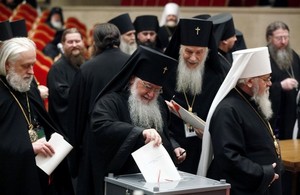 In the course of these days the Russian Orthodox Church is gathering to discuss and pray for a new patriarch. Let us join our prayers together for graces needed to elect the man the Holy Spirit has chosen to lead the Russian Church.
In the course of these days the Russian Orthodox Church is gathering to discuss and pray for a new patriarch. Let us join our prayers together for graces needed to elect the man the Holy Spirit has chosen to lead the Russian Church.
The process of selecting a new father of the Church in Orthodoxy is much different than the way either the Latin or the various Eastern Catholic churches elect a head. Another example of a diversity of gifts given by the Holy Trinity.
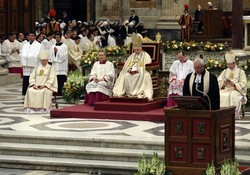 It is a great joy every time we find ourselves gathered at the tomb of the Apostle Paul on the liturgical feast of his conversion to conclude the Week of Prayer for Christian Unity. I greet all of you with affection. I greet in a special way Cardinal Cordero Lanza di Montezemolo, the abbot [Edmund Powers] and the community of monks who are hosting us. I also greet Cardinal Kasper, the president of the Pontifical Council for Promoting Christian Unity. I greet along with him the lord cardinals who are present, the bishops and the pastors of the various Churches and ecclesial communities gathered here this evening.
It is a great joy every time we find ourselves gathered at the tomb of the Apostle Paul on the liturgical feast of his conversion to conclude the Week of Prayer for Christian Unity. I greet all of you with affection. I greet in a special way Cardinal Cordero Lanza di Montezemolo, the abbot [Edmund Powers] and the community of monks who are hosting us. I also greet Cardinal Kasper, the president of the Pontifical Council for Promoting Christian Unity. I greet along with him the lord cardinals who are present, the bishops and the pastors of the various Churches and ecclesial communities gathered here this evening.
A special word of recognition goes to those who worked together in preparing the prayer guides, experiencing firsthand the exercise of reflecting and meeting in listening to each other and, all together, to the Word of God.
St. Paul’s conversion offers us a model that shows us the way to full unity. Unity in fact requires a conversion: from division to communion, from broken unity to healed and full unity. This conversion is the gift of the Risen Christ, as it was for St. Paul. We heard this from the Apostle himself in the reading proclaimed just a moment ago: “By the grace of God I am what I am” (1 Corinthians 15:10).
The same Lord, who called Saul on the road to Damascus, addresses himself to the members of the Church — which is one and holy — and calling each by name asks: Why have you divided me? Why have you wounded the unity of my body?
Conversion implies two dimensions. In the first step we recognize our faults in the light of Christ, and this recognition becomes sorrow and repentance, desire for a new beginning. In the second step we recognize that this new road cannot come from us. It consists in letting ourselves be conquered by Christ. As St. Paul says: “I continue my pursuit in hope that I may possess it, since I have indeed been conquered by Christ Jesus” (Philippians 3:12).
Conversion demands our yes, my “pursuit”; it is not ultimately my activity, but a gift, a letting
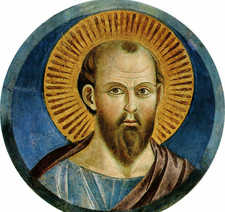 ourselves be formed by Christ; it is death and resurrection. This is why St. Paul does not say: “I converted” but rather “I died” (Galatians 2:19), I am a new creature. In reality, St. Paul’s conversion was not a passage from immorality to morality, from a mistaken faith to a right faith, but it was a being conquered by Christ: the renunciation of his own perfection; it was the humility of one who puts himself without reserve in the service of Christ for the brethren. And only in this renunciation of ourselves, in this conforming to Christ are we also united among ourselves; we become “one” in Christ. It is communion with the risen Christ that gives us unity.
ourselves be formed by Christ; it is death and resurrection. This is why St. Paul does not say: “I converted” but rather “I died” (Galatians 2:19), I am a new creature. In reality, St. Paul’s conversion was not a passage from immorality to morality, from a mistaken faith to a right faith, but it was a being conquered by Christ: the renunciation of his own perfection; it was the humility of one who puts himself without reserve in the service of Christ for the brethren. And only in this renunciation of ourselves, in this conforming to Christ are we also united among ourselves; we become “one” in Christ. It is communion with the risen Christ that gives us unity.
We can observe an interesting analogy with the dynamic of St. Paul’s conversion also in meditating on the biblical text of the prophet Ezekiel (37:15-28), which was chosen as a basis for our prayer this year. In it, in fact, the symbolic gesture is presented of two sticks being joined into one in the prophet’s hand, who represents God’s future action with this gesture. It is the second part of Chapter 37, which in the first part contains the celebrated vision of the dry bones and the resurrection of Israel, worked by the Spirit of God.
How can we not see that the prophetic sign of the reunification of the people of Israel is placed after the great symbol of the dry bones brought to life by the Spirit? There follows from this a theological pattern analogous to that of St. Paul’s conversion: God’s power is first and he works the resurrection as a new creation by his Spirit. This God, who is the Creator and is able to resurrect the dead, is also able to bring a people divided in two back to unity.
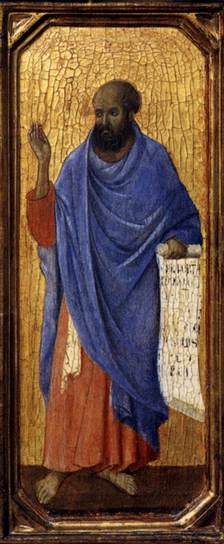 Paul — like Ezekiel but more than Ezekiel — becomes the chosen instrument of the preaching of the unity won by Christ through his cross and resurrection: the unity between the Jews and the pagans, to form one new people. Christ’s resurrection extends the boundary of unity: not only the unity of the tribes of Israel, but the unity of the Jews and the pagans (cf. Ephesians 2; John 10:16); the unification of humanity dispersed by sin and still more the unity of all who believe in Christ.
Paul — like Ezekiel but more than Ezekiel — becomes the chosen instrument of the preaching of the unity won by Christ through his cross and resurrection: the unity between the Jews and the pagans, to form one new people. Christ’s resurrection extends the boundary of unity: not only the unity of the tribes of Israel, but the unity of the Jews and the pagans (cf. Ephesians 2; John 10:16); the unification of humanity dispersed by sin and still more the unity of all who believe in Christ.
We owe this choice of the passage from the prophet Ezekiel to our Korean brothers, who felt the call of this biblical passage strongly, both as Koreans and Christians. In the division of the Jewish people into two kingdoms they saw themselves reflected, the children of one land who, on account of political events, have been divided, north from south. Their human experience helped them to better understand the drama of the division among Christians.
Now, from this Word of God, chosen by our Korean brothers and proposed to all, a truth full of hope emerges: God allows his people a new unity, which must be a sign and an instrument of reconciliation and peace, even at the historical level, for all nations. The unity that God gives his Church, and for which we pray, is naturally communion in the spiritual sense, in faith and in charity; but we know that this unity in Christ is also the ferment of fraternity in the social sphere, in relations between nations and for the whole human family. It is the leaven of the Kingdom of God that makes all the dough rise (cf. Matthew 13:33).
In this sense, the prayer that we offer up in these days, taking our cue from the prophecy of Ezekiel, has also become intercession for the different situations of conflict that afflict humanity at present. There where human words become powerless, because the tragic noise of violence and arms prevails, the prophetic power of the Word of God does not weaken and it repeats to us that peace is possible, and that we must be instruments of reconciliation and peace. For this reason our prayer for unity and peace always requires confirmation by courageous gestures of reconciliation among us Christians.
Once again I think of the Holy Land: how important it is that the faithful who live there, and the pilgrims who travel there, offer a witness to everyone that diversity of rites and traditions need not be an obstacle to mutual respect and to fraternal charity. In the legitimate diversity of different positions we must seek unity in faith, in our fundamental “yes” to Christ and to his one Church. And thus the differences will no longer be an obstacle that separates but richness in the multiplicity of the expressions of a common faith.
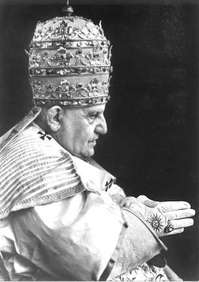 I would like to conclude this reflection of mine with a reference to an event that we older people here have certainly not forgotten. In this place on Jan. 25, 1959, exactly 50 years ago, Blessed Pope John XXIII announced for this first time his desire to convoke “an ecumenical Council for the universal Church” (AAS LI [1959], p. 68). He made this announcement to the cardinals in the chapter room of the Monastery of St. Paul, after having celebrated solemn Mass in the Basilica.
I would like to conclude this reflection of mine with a reference to an event that we older people here have certainly not forgotten. In this place on Jan. 25, 1959, exactly 50 years ago, Blessed Pope John XXIII announced for this first time his desire to convoke “an ecumenical Council for the universal Church” (AAS LI [1959], p. 68). He made this announcement to the cardinals in the chapter room of the Monastery of St. Paul, after having celebrated solemn Mass in the Basilica.
From the providential decision, suggested to my venerable predecessor, according to his firm conviction, by the Holy Spirit, there also derived a fundamental contribution to ecumenism, condensed in the decree Unitatis Redintegratio. In that document we read: “There can be no ecumenism worthy of the name without a change of heart. For it is from renewal of the inner life of our minds, from self-denial and an unstinted love that desires of unity take their rise and develop in a mature way” (7).
The attitude of interior conversion in Christ, of spiritual renewal, of increased charity toward other Christians, created a new situation in ecumenical relations. The fruits of theological dialogues, with their convergences and with the more precise identification of the differences that still remain, led to a courageous pursuit in two directions: in the reception of what was positively achieved and a renewed dedication to the future.
Opportunely, the Pontifical Council for Promoting Christian Unity, which I thank for the service it renders to all the disciples of the Lord, has recently reflected on the reception and future of ecumenical dialogue. Such a reflection, if on one hand rightly desires to emphasize what has already been achieved, on the other hand intends to find new ways to continue the relations between the Churches and the ecclesial Communities in the present context.
The horizon of full unity remains open before us. It is an arduous task, but it is exciting for those Christians who want to live in harmony with the prayer of the Lord: “that all be one so that the world believes” (John 17:21). The Second Vatican Council explained to us “that human powers and capacities cannot achieve this holy objective — the reconciling of all Christians in the unity of the one and only Church of Christ” (Unitatis redintegratio, 24).
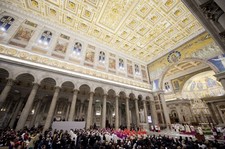 Trusting in the prayer of the Lord Jesus Christ, and encouraged by the significant steps made by the ecumenical movement, with faith we invoke the Holy Spirit that he continue to illumine our path. May the Apostle Paul, who worked so hard and suffered for the unity of the mystical body of Christ, spur us on from heaven; and may the Blessed Virgin Mary, Mother of the unity of the Church, accompany and sustain us.
Trusting in the prayer of the Lord Jesus Christ, and encouraged by the significant steps made by the ecumenical movement, with faith we invoke the Holy Spirit that he continue to illumine our path. May the Apostle Paul, who worked so hard and suffered for the unity of the mystical body of Christ, spur us on from heaven; and may the Blessed Virgin Mary, Mother of the unity of the Church, accompany and sustain us.
Pope Benedict XVI
Basilica of Saint Paul Outside the Walls
Vespers, Conversion of Saint Paul, 2009
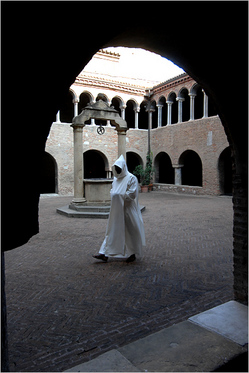 A Spiegel Online article of January 25, 2007 looks into the monastic life from the German perspective: fewer monks and nuns professing vows and more lay people for a way to make sesne of their lives. The experience of the monks and nuns in Europe, in this case Germany, is not unlike the experience one can have in monasteries in the USA when it comes to diminishing numbers, lack of vision and hope for the future, and with plentiful examples of liturgical & theological dissent. One can’t forget that so many of the ’68ers are still in charge.
A Spiegel Online article of January 25, 2007 looks into the monastic life from the German perspective: fewer monks and nuns professing vows and more lay people for a way to make sesne of their lives. The experience of the monks and nuns in Europe, in this case Germany, is not unlike the experience one can have in monasteries in the USA when it comes to diminishing numbers, lack of vision and hope for the future, and with plentiful examples of liturgical & theological dissent. One can’t forget that so many of the ’68ers are still in charge.
But not all is bunk as there are a number of indicators pointing out that people are considering the monastic life anew. In fact, there are bright, generous and fun men and women entering the monasteries: they are on fire with the reality of serving and loving the Lord and His Church; they are ready to spend themselves for the eternal good of others and they are willing to preach Jesus Christ as the one and only Savior for humanity. That doesn’t mean that thousands of men and women are running to cloister but those are very willing to take up the sacrifice of the cloister seriously. In accepting Christ one is never disappointed or easily thrown under the bus.
BUT there are equally bright, generous and loving people whose vocation is not to enter the monastery but it is to follow Christ more deeply in following a rule of life –like the Rule of Saint Benedict– while living in the world. The oblate life (also referred to as a third order or even in a secular institute) is beautiful and flourishing today.
I’ve had this article in my file for a while but some interesting points are worth considering even now. Monastic life in the 3rd millennium.
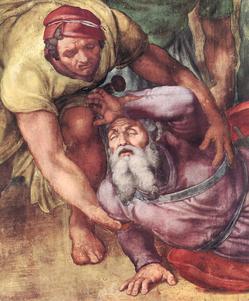 I planted, Apollo watered, but God gave the increase, Alleluia.
I planted, Apollo watered, but God gave the increase, Alleluia.
O thou great Doctor, Paul, we here beseech of thee Lead thou our spirits up to heavenly mystery,
Till ends the partial knowledge that to us is given, While here below, and we receive the fuller light in heaven.
May everlasting honor, power and glory be, And jubilation, to the Holy Trinity, The One God, ever ruling all things mightily, Throughout all endless ages of eternity. Amen.
O God, Who has taught the whole world by the preaching of the blessed Paul the Apostle; we beseech Thee, that we, who this day celebrate his conversion, may by his example advance unto Thee.
On this day 50 years ago (1959), Blessed Pope John XXIII, at the Basilica of St. Paul Outside-the-Walls, announced the Second Vatican Council.
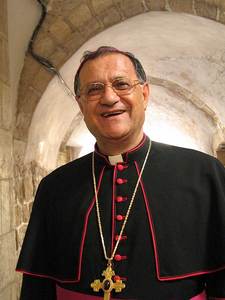 True to itself and its focus on what Eastern Christians have to say, Oasis asked His Beatitude, Archbishop Fouad Twal, the Latin Patriarch of Jerusalem, for his opinion about what is happening in Gaza right now. Oasis met him at this home, in Jerusalem, a few days after the start of Israel’s ‘Cast Lead’ operation. Archbishop Twal’s words show a man clearly affected by the situation, concerned that things might be going backward with disastrous consequences for the whole region.
True to itself and its focus on what Eastern Christians have to say, Oasis asked His Beatitude, Archbishop Fouad Twal, the Latin Patriarch of Jerusalem, for his opinion about what is happening in Gaza right now. Oasis met him at this home, in Jerusalem, a few days after the start of Israel’s ‘Cast Lead’ operation. Archbishop Twal’s words show a man clearly affected by the situation, concerned that things might be going backward with disastrous consequences for the whole region.
Your Beatitude, what are your thoughts about the latest developments?
In our Christmas message we had given voice to hope for peace in the Holy Land. Things seemed close at hand. More and more private meetings were taking place; pilgrims were coming in greater numbers; the economic situation in the Territories was getting better. Now, things are back where they were years ago. Military solutions are never good; violence begets violence. There is a clear imbalance between the parties. There have been too many innocent victims who have nothing to do with Hamas: women, children, families who had a right to lead a normal life, free. Gaza is under siege by land, sea and air. The city has been turned into an open air prison. Objectively such conditions cannot favour peace and reconciliation. In any case it certainly will not boost hope that violence will stop one day. On the contrary!
Doesn’t Israel have a right to defend itself?
Of course! Everyone has the right to self-defence. Israel has won every war in defending itself, but has achieved neither peace, nor security. Counting only on the military option without offering people real alternatives is not a solution. Gaza’s siege does not date from yesterday. This applies to Palestinians as well because even the most extreme situation does not cancel one’s moral responsibilities vis-à-vis one’s actions. But this is true not only for Palestinians.
What is a way out then?
I’ll leave that to the politicians and the specialists. It’s obvious that diplomatic negotiations have not led to good results as far as violence in Gaza is concerned. And yet we can also see that awareness about solving this problem has increased at the international level. There are three or four good initiatives underway. The world seems to be doing more to solve the problems of the Middle East. Hope never dies, even if it is already very late. The only way out is political. But if there is no good will by the parties involved, all we’ll ever get are empty words, promises and meetings without any results.
What should Christians in the Holy Land and around the world do about events in Gaza?
First of all everyone must assume his or her responsibilities. Violence calls for our conversion. Our heart must convert, what we say must change, our outlook must change. Widespread mistrust does not help; it is very destructive.
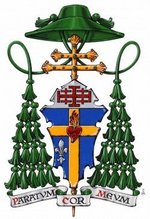 Is the visit by the Holy Father a good idea?
Is the visit by the Holy Father a good idea?
In Jerusalem we are grateful to the Pope for his constant attention and words. We are certain that a visit would help us a lot; the same is true for pilgrims who come to the Holy Land. They can help us remind the international community that joint action is always more courageous; they can exert pressure in favour of greater justice and peace for all. Pious words are not enough; we need acts of courage.
Courtesy of the Oasis International Studies and Research Centre
With the Church we pray:
O God, Who did will that blessed Francis, Thy Confessor and Bishop, should become all things unto all men for the salvation of their souls, mercifully grant that being filled with the sweetness of Thy love, we may, through the guidance of his counsels and the aid of his merits attain the aid the joys of everlasting life.
Saint Francis de Sales (1567-1622) born in Thorens, Savoy, in France, was a brilliant student and lawyer. At an early age he was nominated Bishop of Geneva and later he vigorsly fought Calvinism. Together with Saint Jane Frances de Chantal he founded the Order of the Visitation. A classic book on the spiritual life is de Sales’ Introduction to the Devout Life. He died in Lyons and was canonized in 1665. In 1877, Pope Blessed Pius IX proclaimed him Doctor of the Church. Pius XI declared him patron of journalists and other writers.
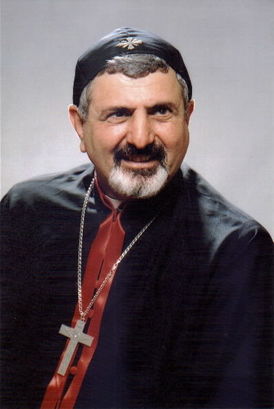 Yesterday, Bishop Joseph Younan, 65, eparch of the New Jersey centered Eparchy of Our Lady of Deliverance (in the USA & Canada) was elected Patriarch of Antioch of the Syrians today. His Beatitude, Ignace Joseph III Younan succeeds His Beatitude Mar Ignace Pierre Abdel-Ahad and a temporary administration of the patriarchate.
Yesterday, Bishop Joseph Younan, 65, eparch of the New Jersey centered Eparchy of Our Lady of Deliverance (in the USA & Canada) was elected Patriarch of Antioch of the Syrians today. His Beatitude, Ignace Joseph III Younan succeeds His Beatitude Mar Ignace Pierre Abdel-Ahad and a temporary administration of the patriarchate.
Pope Benedict accepted a request for full ecclesiastical communion with the new patriarch (according to the Eastern Code of Canon Law), here is the letter of concession. The granted the request of communion “willingly, thus performing a part of the Petrine ministry which gives me particular pleasure. Communion with the Bishop of Rome, Peter’s Successor, established by the Lord as the visible foundation of unity in faith and charity, guarantees the bond with Christ the Pastor and introduces the particular Churches into the mystery of the One, Holy, Catholic and Apostolic Church”.
Pope Benedict XVIs address (in French) to the new patriarch and the bishops of the synod.
In brief, the Pope said: “My hope is that in the East, where the Gospel was first announced, Christian communities may continue to live and bear witness to their faith, as they have over the centuries. At the same time I hope that all those outside their homeland may receive adequate pastoral care so as to maintain the bond with their religious roots”. The Pope then voiced his hope that the Eastern Churches, “wherever they may be, are able to integrate themselves into their new social and ecclesial surroundings without losing their own identity and conserving the imprint of their Eastern spirituality, so that, using the words East and West, the Church may speak effectively of Christ to modern mankind”.
The bishops of the Syrian Catholic Church have been meeting in synod in Rome since the 18th.
More info about the new patriarch and the Syrian Catholic Church can be had at a H2O News video segment, a 2008 CNEWA article and in a Wiki article.
May Mary, Mother of God intercede for the new patriarch and the Syrian Catholic Church before the Throne of Grace.
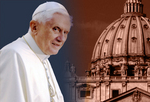 Watch the Pope (and the Church) at The Vatican –in 4 languages. A different angle in reporting…giving the Truth!
Watch the Pope (and the Church) at The Vatican –in 4 languages. A different angle in reporting…giving the Truth!
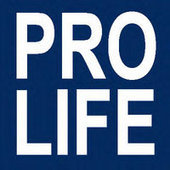 Our nation is at a critical point in the fight to protect the unborn. The latest proposed legislation, the Freedom of Choice Act (FOCA), calls for a significant increase in unlimited amount of abortions in this country. But FOCA goes far beyond that – it seeks to force hospitals and health care providers to violate their own consciences by requiring that abortions and abortion referrals be made available to clients seeking such services. This legislation seeks to eliminate the choice for those whose beliefs would preclude their participation in the acts of death which the proposed law would require.
Our nation is at a critical point in the fight to protect the unborn. The latest proposed legislation, the Freedom of Choice Act (FOCA), calls for a significant increase in unlimited amount of abortions in this country. But FOCA goes far beyond that – it seeks to force hospitals and health care providers to violate their own consciences by requiring that abortions and abortion referrals be made available to clients seeking such services. This legislation seeks to eliminate the choice for those whose beliefs would preclude their participation in the acts of death which the proposed law would require.
The impact on the lives of those who practice medicine and those, such as the Catholic Church, who provide hospitals and health care facilities, would be profound. This is on top of the “rights” which the bill purports to protect that virtually eliminates any restrictions on abortion and removes parental rights of notice when abortions are performed for minors.
The Bishops of the United States have asked all Catholic organizations to support a campaign that will also be rolled out through parishes throughout the country – it is being called the National Pro-Life Postcard Campaign to Congress. Cardinal Justin Rigali referenced this campaign in his homily at the Pro-Life vigil on Wednesday at the National Basilica of the Immaculate Conception.
Every person who believes that abortion is wrong, that “Freedom of Choice” actually denies choice to those whose conscience would be violated by the legislation’s requirements, needs to take action. As the United States Conference of Catholic Bishops (USCCB) have said, “FOCA goes far beyond the Supreme Court’s 1973 Roe v. Wade abortion decision. No other piece of legislation would have such a destructive impact on society’s ability to limit or regulate abortion… The national postcard campaign will send a timely message to Congress that abortion advocates are out of step with mainstream America, and that their agenda should not become part of our nation’s laws in any way.”
Please link to the USCCB’s website by using the URL here – it will conveniently allow you to send electronic postcards to your Senators and your Congressional delegate, expressing your strong opinion in opposition to FOCA. As Edmund Burke is so often quoted, “All that is necessary for the forces of evil to win in the world is for enough good men to do nothing.” Place your cursor on the URL and press Ctrl & click or paste the URL in your internet browser.
 We cannot do nothing – this postcard campaign is not enough, but it is something – a small but important step to insure that the voices of those who support the pro-life movement are heard, loud and clear. Please take the few moments required to send the electronic postcards.
We cannot do nothing – this postcard campaign is not enough, but it is something – a small but important step to insure that the voices of those who support the pro-life movement are heard, loud and clear. Please take the few moments required to send the electronic postcards.
AND we have to be even more vigilant in a variety of areas legislation which threatens the unborn and the conscience, e.g., foreign policy.